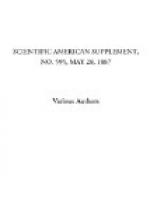CLIMATE IN ITS RELATION TO HEALTH. By G.V. POORE, M.D.
[Footnote: Three lectures before the Society of Arts, London. From the Journal of the Society.]
LECTURE III. DISEASES CAUSED BY FLOATING MATTER IN THE AIR.
The information which modern methods of research have given us with regard to the floating matter in the air is of an importance which cannot be overestimated.
That the air is full of organic particles capable of life and growth is now a matter of absolute certainty. It has long been a matter of speculation, but there is a great difference between a fact and a speculation. An eminent historian has recently deprecated the distinction which is conventionally drawn between science and knowledge, but, nevertheless, such a distinction is useful, and will continue to be drawn. A man’s head may be filled with various things. His inclination may lead him, for example, to study archaic myths in the various dialects which first gave them birth; he may have a fancy for committing to memory the writings of authors on astrology, or the speculations of ancient philosophers, from Aristotle and Lucretius downward. Such a one may have a just claim to be considered a man of learning, and far be it from me to despise the branches of knowledge toward which his mind has a natural bent. But in so far as his knowledge is a knowledge of fancies rather than facts, it has no claim to be called science.
Fancies, however beautiful, cannot form a solid basis for action or conduct, whereas a scientific fact does. It is all very well to suppose that such and such things may be, but mere possibilities, or even probabilities, do not breed a living faith. They often foster schism, and give rise to disunited or opposed action on the part of those who think that such and such things may not be.
When, however, a fancy or a speculation becomes a fact which is capable of demonstration, its universal acceptance is only a matter of time, and the man who neglects such facts in regulating his actions or conduct is rightly regarded as insane all the world over.
The influence of micro-organisms on disease is emerging more and more, day by day, from the regions of uncertainty, and what once were the speculations of the few are now the accepted facts of the majority.
Miquel’s experiments show very clearly that the number of microbes in the air corresponds with tolerable closeness to the density of population. From the Alpine solitudes of the Bernese Oberland to the crowded ward of a Parisian hospital, we have a constantly ascending ratio of microbes in the air, from zero to 28,000 per cubic meter. Their complete absence on the Alps is mainly due to the absence of productive foci. Organic matter capable of nourishing microbes is rare, and the dryness and cold prevent any manifestation of vitality or increase. Whence come the large number of microbes in the crowded places and in hospitals?




